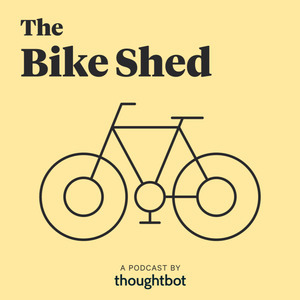The Bike Shed
Episodes
-
96: Who Stinks?
January 27th, 2017 | 39 mins 26 secs
Baby Ruby, Ruby refinements, Rails discoverability, and annoying polyfills.
-
95: Click 'Cat' to go 'Home' (Morgane Santos)
January 20th, 2017 | 28 mins 35 secs
Amanda is joined by Morgane Santos to discuss the experiences, technology, and development of Virtual Reality.
-
94: It's Not Supposed to Work
January 11th, 2017 | 44 mins 8 secs
We discuss the pain of custom inputs in HTML, ActiveRecord bugs, and Rust's Fire Flower.
-
93: I Have Complex Feelings
December 21st, 2016 | 41 mins 35 secs
The impact of codes of conduct on community behavior, shipping a mobile app written in Elm, and yet more to say on SemVer.
-
92: The Queen of Canada
December 16th, 2016 | 38 mins 22 secs
We discuss the sneaky performance differences between
present?,any?,blank?andempty?with ActiveRecord, when N+1 is a "feature", and the future of Diesel. -
91: I Think It's a Fish
December 8th, 2016 | 41 mins 5 secs
Derek briefly complains of the staleness of the asset pipeline in Rails 5, before Sean catches Derek up on Rails 5.1's support for Webpack, Yarn, and ES6. We also discuss the pain of deprecations in the upgrade to Rails 5.
-
90: Freedom Units
December 1st, 2016 | 35 mins 51 secs
We discuss adventures with shared mutable state in Elixir before turning to our thoughts on mocking HTTP interaction and how our approaches may differ depending on the language we’re using.
-
89: There Will Never Be One Right Way (Ashley Williams)
November 23rd, 2016 | 37 mins 52 secs
Ashley Williams joins the show to discuss NPM, Yarn, and the general package manager ecosystem.
-
88: How Many Puppies Now?
November 18th, 2016 | 29 mins 39 secs
Amanda and Sean discuss talk prep and slide envy before diving in to Kotlin 1.0.5, UTF-8 identifiers in programming, and responsive layouts in Android.
-
87: The Refrigerator Took Down Your Website
November 10th, 2016 | 32 mins 1 sec
We talk about a widespread DNS outage and what steps you might take to avoid or limit your application's exposure to these things in the future.
-
86: Purple Train, Purrrple Train (Ian Anderson)
November 2nd, 2016 | 30 mins 46 secs
Derek chats with Ian Anderson about developing a mobile app for iOS and Android with React Native.
-
85: Are We in a Black Hole?
October 26th, 2016 | 53 mins 13 secs
We briefly ponder the very nature of our existence before discussing edge cases and interesting bugs encountered in ActiveRecord.
-
84: Why Are Manhole Covers Round?
October 19th, 2016 | 50 mins 42 secs
What do we look for when reviewing job applications, interviewing candidates, and pairing with prospective co-workers?
-
83: Canadian Halloween
October 12th, 2016 | 27 mins 37 secs
Sean encounters a roadblock in updating Diesel to use Rust’s new soon-to-be-stabilized procedural macros. Derek and Sean discuss the most recent CVE filed for Bundler, which is a lot like the previous CVE filed for Bundler.
-
82: I Just Want a Dog in a Spacesuit
October 5th, 2016 | 50 mins 51 secs
We discuss the problems with getting a CVE and the new lightning fast search tool, ripgrep. Sandwiched between those topics, we dive into the colonization of Mars. Yes, that's right, Mars.
-
81: Is This Really a CVE?
September 28th, 2016 | 27 mins 21 secs
Derek and Sean talk through how to handle a security vulnerability that was reported for Clearance, a user authentication library.
